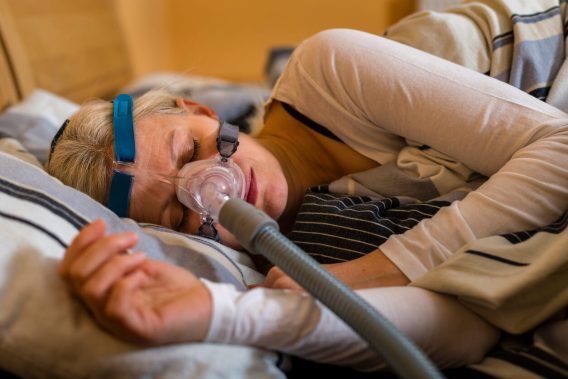Long COVID-19 Risk Increases for People With Sleep Apnea
Editors carefully fact-check all Drugwatch.com content for accuracy and quality.
Drugwatch.com has a stringent fact-checking process. It starts with our strict sourcing guidelines.
We only gather information from credible sources. This includes peer-reviewed medical journals, reputable media outlets, government reports, court records and interviews with qualified experts.

A study published in May in the journal Sleep has found that people with obstructive sleep apnea have a much higher risk of long COVID-19. According to the study, women have a much greater risk than men.
Researchers from the National Institutes of Health RECOVER initiative studied the health data of nearly 1.8 million people. They found that women with obstructive sleep apnea can have an 89% higher risk of long COVID-19. Data showed that men with sleep apnea have a 59% higher risk. There was no data in the study confirming a link between sleep apnea and long COVID-19 in children.
People who experience one or more symptoms of COVID-19 for weeks, months or even years after being infected with the virus are considered to have long COVID.
Higher Risk of Long COVID for Women
The significantly higher risk of long COVID-19 in women with sleep apnea compared to men could be due to many factors.
“Women typically have stronger immune responses to viral infections, and thus also vulnerability for post-infection inflammation,” Dr. Phyllis Zee, director of the Center for Circadian and Sleep Medicine at Northwestern University Feinberg School of Medicine in Chicago, told CNN. “Women in general have more insomnia and with long Covid tend to present with fatigue and insomnia symptoms, which are also common symptoms of long Covid.”
According to researchers, men are two to three times more likely to be diagnosed with sleep apnea compared to women. This could explain why many women are diagnosed with the disorder later, when the condition may be more severe.
Sleep Apnea Treatments and COVID-19
Those with sleep apnea may benefit from using a CPAP machine. However, there have been recalls of Philips CPAP machines due to manufacturing defects that could lead to health problems, some of them severe. People who experienced serious health issues from a defective CPAP machine have filed Philips CPAP lawsuits against the manufacturer.
For those already infected with COVID-19, it’s important to continue using the CPAP machine. Pharmacist and respiratory therapist Neisha Hacker-Finey suggests consulting with a doctor to discuss if the settings on the machine need to be adjusted. Higher CPAP pressure may be needed for oxygenation in those who are infected by the virus.
COVID-19 Connection
The connection between sleep apnea and long COVID-19 is still being investigated. However, doctors say there are several common risk factors for both conditions, including cardiovascular problems, hypertension and obesity.
Sleep apnea affects about one in eight adults. It causes low levels of oxygen in the blood, which can exacerbate COVID-19 symptoms. The body’s immune system can also be compromised by sleep apnea, making it more likely a person becomes infected with COVID-19.
“The combination of sleep apnea and COVID-19 infection together can be very challenging for our bodies to overcome,” said Hacker-Finey. “At this point, the body’s immune system is weakened. With a weak immune system we cannot fight off additional infections easily, and our heart and lungs go into overdrive trying to perfuse oxygenated blood to our vital organs.”
Hacker-Finey said other long-term symptoms from COVID-19 may include cognitive issues, memory impairment and shortness of breath.
“These symptoms can present anywhere between three months after infection and last up to a year,” she said.